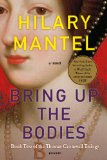Summary | Excerpt | Reading Guide | Reviews | Beyond the Book | Readalikes | Genres & Themes | Author Bio

Wolf Hall Trilogy #2
by Hilary Mantel
At home in his city house at Austin Friars, his portrait broods on the wall; he is wrapped in wool and fur, his hand clenched around a document as if he were throttling it. Hans had pushed a table back to trap him and said, Thomas, you mustn't laugh; and they had proceeded on that basis, Hans humming as he worked and he staring ferociously into the middle distance. When he saw the portrait finished he had said, 'Christ, I look like a murderer'; and his son Gregory said, didn't you know? Copies are being made for his friends, and for his admirers among the evangelicals in Germany. He will not part with the original – not now I've got used to it, he says – and so he comes into his hall to find versions of himself in various stages of becoming: a tentative outline, partly inked in. Where to begin with Cromwell? Some start with his sharp little eyes, some start with his hat. Some evade the issue and paint his seal and scissors, others pick out the turquoise ring given him by the cardinal. Wherever they begin, the final impact is the same: if he had a grievance against you, you wouldn't like to meet him at the dark of the moon. His father Walter used to say, 'My boy Thomas, give him a dirty look and he'll gouge your eye out. Trip him, and he'll cut off your leg. But if you don't cut across him, he's a very gentleman. And he'll stand anybody a drink.'
Hans has drawn the king, benign in summer silks, seated after supper with his hosts, the casements open to late birdsong, the first tapers coming in with the candied fruits. At each stage of his progress Henry stops in the principal house, with Anne the queen; his entourage beds down with the local gentlefolk. It is usual for the king's hosts, once at least in the visit, to entertain these peripheral hosts by way of thanks, which places a strain on the housekeeping arrangements. He has counted the provision carts rolling in; he has seen kitchens thrown into turmoil, and he himself has been down in the grey-green hour before dawn, when the brick ovens are swabbed out ready for the first batch of loaves, as carcasses are spitted, pots set on trivets, poultry plucked and jointed. His uncle was a cook to an archbishop, and as a child he hung about the Lambeth Palace kitchens; he knows this business inside out, and nothing about the king's comfort must be left to chance.
These days are perfect. The clear untroubled light picks out each berry shimmering in a hedge. Each leaf of a tree, the sun behind it, hangs like a golden pear. Riding westward in high summer, we have dipped into sylvan chases and crested the downs, emerging into that high country where, even across two counties, you can sense the shifting presence of the sea. In this part of England our forefathers the giants left their earthworks, their barrows and standing stones. We still have, every Englishman and woman, some drops of giant blood in our veins. In those ancient times, in a land undespoiled by sheep or plough, they hunted the wild boar and the elk. The forest stretched ahead for days. Sometimes antique weapons are unearthed: axes that, wielded with double fist, could cut down horse and rider. Think of the great limbs of those dead men, stirring under the soil. War was their nature, and war is always keen to come again. It's not just the past you think of, as you ride these fields. It's what's latent in the soil, what's breeding; it's the days to come, the wars unfought, the injuries and deaths that, like seeds, the soil of England is keeping warm. You would think, to look at Henry laughing, to look at Henry praying, to look at him leading his men through the forest path, that he sits as secure on his throne as he does on his horse. Looks can deceive. By night, he lies awake; he stares at the carved roof beams; he numbers his days. He says, 'Cromwell, Cromwell, what shall I do?' Cromwell, save me from the Emperor. Cromwell, save me from the Pope. Then he calls in his Archbishop of Canterbury, Thomas Cranmer, and demands to know, 'Is my soul damned?'
Copyright © 2012 by Hilary Mantel
Your guide toexceptional books
BookBrowse seeks out and recommends the best in contemporary fiction and nonfiction—books that not only engage and entertain but also deepen our understanding of ourselves and the world around us.